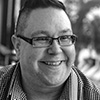-
Issue 84
-
Editor's Note
-
POETRY
- Nico Amador
- Christopher Bakken
- Rosebud Ben-Oni
- Beverly Burch
- Cyrus Cassells
- Joanne Diaz
- CD Eskilson
- Joseph Fasano
- Augusta Funk
- Mag Gabbert
- David Groff
- Kelle Groom
- James Allen Hall
- Ricardo Hernandez
- Abbie Kiefer
- Sandra Marchetti
- Kelly Moffett
- Caroline Plasket
- Jacob Rivers
- Esteban Rodriguez
- Hayden Saunier
- Katherine Smith
- Samn Stockwell
- Noah Warren
- Maw Shein Win
-
BOOK REVIEW
- Eric Fishman reviews The Poetry of Pierluigi Cappello
translated by Todd Portnowitz - Kim Jacobs-Beck reviews Quantum Heresies
by Mary Peelen - David Rigsbee reviews Summer Snow
by Robert Hass
- Eric Fishman reviews The Poetry of Pierluigi Cappello
Issue > Poetry
Genre Theory
Do I begin, Once upon a time I fell in love with ending?
Do I say, Once upon a time I was awash in deathwish?
Once upon a time could mean en media res
or the archaic past's everyday,
e.g., I could be on the couch, watching The Real
Housewives of New Jersey when fantasy breaks in,
all usurping commercial interlude,
and I am a hunter in an enchanted field,
gun in hand, raising it to my mouth,
lipping the barrel, roughing my teeth with it,
feeling it graze my mouth's grooved roof.
How peace ruled all the people in the land then.
How do I say precisely the terror, living
in both times equally real. Say: Once upon a
limitless sky above a golden field I pull a trigger.
In that story, what tense is the narrator utilizing?
Future married to present? Is it not just sky but time
stretching out like a map? Or is my body already dead,
the voice persisting, wind winding between trees
—story's lyric freedom, what we call historical present,
which is time tinted, tipped toward urgency,
time stained with the yes, now, pull it? How do you say
I was in love with the unspeakable? What do you call
a man locked by time in a story that won't be named?
Genre Theory: Family
Derived from Latin famulitas, meaning servitude.
As when my uncle kissed my sister on the stairs
and she called to ask my advice, then hissed,
Writing this would be a betrayal. I do not put the "I"
in family, from whom is drawn my next of kin
like a bucket up from the village well. Family,
of which I spell the end. "Happiness," George Burns
says, "is having a large, loving, caring, close-knit family
in another city." Houston hosted the Republican
National Convention in '92, when we lived in Florida,
safe distance away except for television, beaming
the angel particles into our family room, where we
watched Pat Robertson preach that Clinton was a blight
because "he wants to repeal the ban on homosexuals
in the military and appoint homosexuals" to his cabinet,
pausing to permit the flamingo-pink homo-horror
to sink in, spotlighting his point that Clinton was author
of "a radical plan to destroy the traditional family."
Family, which at least one pope called "the first essential
cell of human society." Cells replicate, unthinkingly.
When HIV crossed the interspecies barrier, it was first
named Gay-Related Immune Deficiency—cells gone
rogue, radical in the blood. Family: where hurt goes
to duplicate itself, unthinkingly. Family: why do I hear
the word failingly? Family: I had one once.
When it was my turn to choose for Movie Night,
I was notorious for selecting stories about people
like me: Peter's Friends or Philadelphia, Being with Claude
or The Hanging Garden. They protested I had a radical
plan to make myself visible. Nevermind
that the gay men always died. I should have picked
gay directors instead—Haynes and Almodóvar,
van Sant and Araki, but I didn't know how to elect
my own family. I had yet to be born. I had an in utero
understanding of what family meant: a species you cross
out, a place you leave behind if you want to stay alive.
Creation Myth
First a seed burrows an absence in soil.
It feels almost innocuous, being occupied.
Rain and time make a hole into halo. Then
the alive fights against gravity, fights
the familiar stratum until its little singular
glimmer claws free. But first it takes a mother.
I held him. I held god as he pulsed into me
like light into snow. I was made to stomach
such humiliation. If I'd been built
impermeable, this would be a story of waste
instead of ruin. I held him until light rooted
in me, propagating its cleaving kind,
an infection we didn't have a cure for.
At the beginning of time, you were a violence
I had to love, made in his image. And now
you think I am telling your story—the creation
of desire, first come-cry to flower in fertile dirt.
Because you seek only your own reflection:
in oak bark, in silver moss, in a night sky
dark as my conscience is now. Tell me
one story regret doesn't plague, I'll show you
a beauty which won't penetrate. Isn't that
the worst part, story winding its way into us,
staining our eyes its particular prophecy?
I remember not just the story of your creation
but pain sharp in my side every time you took
an overlarge breath. One story opens
another, everything crowds in to speak.
But this is mine: there was a wound,
then a world. It did not mean me well.
I subsisted. I grew. I've come all this way
to recommend living as an act of vengeance.



